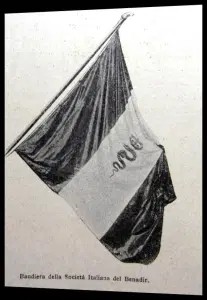
This page is part of © FOTW Flags Of The World website
Commercial Company of Benadir (1898-1903)
Last modified: 2025-04-19 by bruce berry
Keywords: somalia | benadir |
Links: FOTW homepage |
search |
disclaimer and copyright |
write us |
mirrors
 image by Jean-Marc Merklin, 14 May 2023
image by Jean-Marc Merklin, 14 May 2023
See also:
BackgroundPrelude
The indirect colonisation of the Somali coast was
initiated in 1890 by the President of the Council (PM) Giovanni Giolitti when he
ordered the consul Vincenzo Filonardi, ambassador to the sultanates of the
Somali coast, to found a trading company, the "V. Filonardi & Co.", through
which Italy would negotiate concessions as well as the sale and
political-administrative management of the territory with the local lords of
Benadir.
In 1893, the company thus concluded an agreement giving it the management of
issues related to trade, industry, commercial agriculture as well as the
migrations of Italian settlers to the African coasts and the management of
commercial stations in Benadir (Mogadiscio, Brava, Merca, Warsheikh). At the
same time, the company ensures the political representation of the government of
the Kingdom of Italy to the Sultanates.
However, in 1896, poor management by the company prompted the government not to
renew the concession.
Creation of the Cie
The experience of indirect colonialism was then reproduced by a trust that took
the name of "Compagnia Commerciale del Benadir" (Commercial Company of
the Benadir) whose shareholders were the magnates of the
Lombard textile industry Sanseverino, Mylius, Carminati and Benigno-Crespi
who aimed to produce the raw materials of their sector in "Italian" territory
and thus avoid excessive import costs. The agreement was signed in 1898 and
became operational in 1900 with the installation of the Company's offices in
Benadir, which contributed to the infiltration of the interior territories.
Outcome
Attempts to penetrate southern Somalia led by the company's representatives came
up against the manifest hostility of the landowners-slaves of the plain, the
Arab-Indian merchants, the native mercantile petty bourgeoisie and the Islamic
clergy; the revolt of the powerful Bimal slaver tribes following the opposition
made by the Italian State to the slave trade led to the total failure of the
policy of "pacification" as it had been theorized in Rome.
The contrasts between the leaders of the Company and the military, the
revelations about the complicity of the administration in maintaining slavery in
the peripheral territories, the excesses committed in the repressions and the
negative balance sheets on the economic management of the colony (including
speculation to the detriment of a healthy entrepreneurial mentality) in 1903
triggered a violent press campaign and a very lively parliamentary debate on the
management model of Benadir. The results of the Chiesi-Travelli investigation
promoted by the Company itself to verify the veracity of the reported facts
revealed multiple embezzlements leading the Giolitti-Tittoni government to
denounce the 1898 convention and withdraw the management of the colony from the
Company. (Source:
L'Italia Coloniale
website)
Jean-Marc Merklin, 14 May 2023
Commercial Company of Benadir
flag
 image sent by Jean-Marc Merklin, 14 May 2023
image sent by Jean-Marc Merklin, 14 May 2023
The website "L'Italia Coloniale"
shows a photograph of the flag of the "Commercial Company of the Benadir" (Compagnia
Commerciale del Benadir) which existed from 1898 to 1903. The flag is based
on the
Italian flag, in the centre of white stripe of which is the crowned symbol of the wyvern of
Milan, city from which the majority of shareholders came from.
From the end of the 19th century until 1903, the Somali territories under
Italian control, before being the object of direct colonisation starting from
1905, were the object of an indirect colonisation, entrusting the management
administration to private companies to which the State granted concessions. One
of them was the "Compagnia Commerciale del Benadir". Its failure, due in
particular to the competitive opposition with the Arab-Indian comprador
bourgeoisie trading essentially with British Somaliland, the opposition of the
Islamic clergy and especially to the compromise with the slaver tribes Bimal and
Intera, announced the real beginning of the "Italian Colony of Somalia",
unifying the territorial concessions. The conflict against the Bimal resistance
lasted until 1908 in an active way and, more sporadically around Merca until
1924.
Jean-Marc Merklin, 14 May 2023
 image sent by Jean-Marc Merklin, 14 May 2023
image sent by Jean-Marc Merklin, 14 May 2023
 image by Jean-Marc Merklin, 14 May 2023
image by Jean-Marc Merklin, 14 May 2023